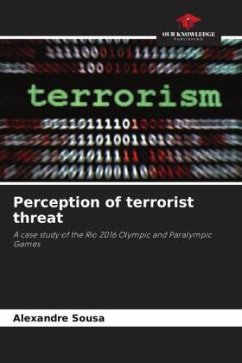"Physical and/or psychological violence, motivated by political objectives, fanaticism and/or religious extremism, with the purpose of causing intimidation, fear and uncertainty in randomly chosen victims by isolated individuals and/or non-state groups, in the course of a tactical action. The use of social networks favors clandestinity, serves as a propaganda platform and is at the heart of the planning and strategy of contemporary terrorism." Using the case of the city of São Paulo - one of the host cities of the Olympics in Brazil - as a reference, the author studies the influence of the mega-event on the perception of threats in Brazil's most populous city. Using a sample group made up of members of the tourism sector and related services, the author investigates themes that are not common in Brazilian daily life, such as the perception of threat and the concept of terrorism itself. Based on the works of Alex Schmid, David Rapoport and Martha Crenshaw, among others - and on data obtained from field research - this book presents an academic view of the perception of terrorist threat and the importance of the subject in shaping an effective security architecture.








